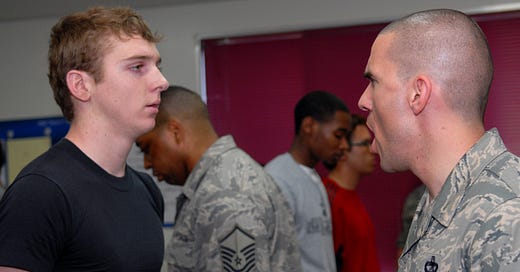Being Abrasive is a Life Skill
Why a Nurse's 'Command Voice' Is Just as Important as Their Bedside Manner
I’ve always been someone who internalizes feedback, especially about my personality. A few years ago, I was told that I come off as abrasive, and while that comment has stuck with me, I’ve realized that it’s not something I want to erase completely. Instead, I’ve learned to embrace and channel this trait in ways that benefit me (hopefully), particularly in high-pressure environments. One of the areas where I’ve found this to be especially valuable is in my volunteer service as an EMT and as a nursing student.
In the military, the concept of a “command voice” is vital—it's the authoritative tone that allows for clear, immediate, and decisive communication. I’ve discovered that the same voice that might seem abrasive in a casual setting can be precisely what’s needed in emergencies, whether it’s to herd panicked family members, get a team moving, or keep a patient calm in a crisis.
In the military, a command voice is confidence personified. It’s loud, clear, and authoritative without being unnecessarily harsh. It cuts through confusion and ensures everyone knows exactly what needs to happen, when, and how.
As an EMT, I’ve discovered the command voice serves a similar purpose. Emergencies in the field are often chaotic, and clear communication can mean the difference between life and death. Whether directing a team during a cardiac arrest or keeping an agitated patient from escalating, the ability to command attention and inspire immediate action is invaluable.
During one fire department call, my crew responded to a cardiac arrest. The scene at the house was chaotic, but our team was ready. Our officer used his command voice to establish order and direct roles; the shift into action was immediate, and the direct orders helped everyone focus on their tasks. Later, during our debrief, a teammate commented, “That was one of the smoothest arrests I’ve ever been to.”
As much as I value my command voice, I’ve learned that emergency response and nursing can also require more than just authority. Patients and their families aren’t subordinates; they’re scared, vulnerable people who need empathy as much as competence.
In the military, you don’t always have to explain why something needs to happen. However, in medicine (nursing and as an EMT), patients and their families must trust you and consent. That’s where bedside manner comes in: it’s not just what you say but how you say it. As an EMT, I’ve also realized that staying calm and maintaining professionalism helps me manage the situation better and helps others stay calmer, too. Knowing and acting like, “This isn’t my emergency,” creates an atmosphere of control and confidence that reassures everyone involved.
Like the military, being an EMT and eventually a nurse is about earning trust while inspiring action. Whether using a firm command voice or calm reassurance, the goal is to ensure everyone feels safe, heard, and cared for. The challenge is knowing which tool to use at the right time, and I’m still learning.
As I continue my nursing education and my role as an EMT, I plan to carry these lessons into my future practice.
Sometimes, the best thing we can do is adapt our tone to meet the moment's needs. And if that means occasionally channeling my inner MTI—or whispering words of encouragement—so be it. After all, both approaches save lives, just in different ways.
Emalee Mahr was an intelligence professional who supported kinetic strikes across the globe.




